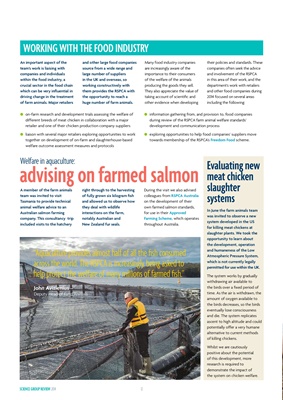
SCIENCE GROUP REVIEW 2014 12
WORKING WITH THE FOOD INDUSTRY
An important aspect of the
team's work is liaising with
companies and individuals
within the food industry, a
crucial sector in the food chain
which can be very influential in
driving change in the treatment
of farm animals. Major retailers
and other large food companies
source from a wide range and
large number of suppliers
in the UK and overseas, so
working constructively with
them provides the RSPCA with
the opportunity to reach a
huge number of farm animals.
Many food industry companies
are increasingly aware of the
importance to their consumers
of the welfare of the animals
producing the goods they sell.
They also appreciate the value of
taking account of scientific and
other evidence when developing
their policies and standards. These
companies often seek the advice
and involvement of the RSPCA
in this area of their work, and the
department's work with retailers
and other food companies during
2014 focused on several areas
including the following:
l on-farm research and development trials assessing the welfare of
different breeds of meat chicken in collaboration with a major
retailer and one of their chicken production company suppliers
l liaison with several major retailers exploring opportunities to work
together on development of on-farm and slaughterhouse-based
welfare outcome assessment measures and protocols
l information gathering from, and provision to, food companies
during review of the RSPCA farm animal welfare standards'
development and communication process
l exploring opportunities to help food companies' suppliers move
towards membership of the RSPCA's Freedom Food scheme.
Welfare in aquaculture:
advising on farmed salmon
A member of the farm animals
team was invited to visit
Tasmania to provide technical
animal welfare advice to an
Australian salmon farming
company. This consultancy trip
included visits to the hatchery
right through to the harvesting
of fully grown six kilogram fish
and allowed us to observe how
they deal with wildlife
interactions on the farm,
notably Australian and
New Zealand fur seals.
During the visit we also advised
colleagues from RSPCA Australia
on the development of their
own farmed salmon standards,
for use in their Approved
Farming Scheme, which operates
throughout Australia.
Evaluating new
meat chicken
slaughter
systems
In June the farm animals team
was invited to observe a new
system developed in the US
for killing meat chickens at
slaughter plants. We took the
opportunity to learn about
the development, operation
and humaneness of the Low
Atmospheric Pressure System,
which is not currently legally
permitted for use within the UK.
The system works by gradually
withdrawing air available to
the birds over a fixed period of
time. As the air is withdrawn, the
amount of oxygen available to
the birds decreases, so the birds
eventually lose consciousness
and die. The system replicates
ascent to high altitude and could
potentially offer a very humane
alternative to current methods
of killing chickens.
Whilst we are cautiously
positive about the potential
of this development, more
research is required to
demonstrate the impact of
the system on chicken welfare.
"Aquaculture provides almost half of all the fish consumed
across the world. The RSPCA is increasingly being asked to
help protect the welfare of many millions of farmed fish."
John Avizienius -
Deputy Head of Farm Animals